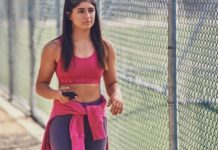
As a sports dietitian, the question “Should I eat before working out?” is one I get on an almost daily basis. Like many questions about fueling, the answer isn’t straightforward; it depends on the intensity of the workout, the workout duration, the athlete, the goals of the session and a bunch of other factors.
These scenarios should give you a better idea of whether or not you need to eat before exercising:
SKIP FOOD BEFORe EXERCISING IF …
- You are exercising very early in the morning. In this situation — assuming you consumed sufficient food the night before — waking up even earlier to consume food risks sleep deprivation. Even if it’s just an hour. Your body should have enough fuel from the previous night to utilize. If your workout is long, start fueling early on.
- Your workout is less than an hour long. While an hour of training can require high amounts of energy, your body should have enough stores to not require extra fuel. Generally speaking, we have roughly 2,000 calories of glucose in our muscles and liver waiting to be utilized for energy at any given time. As long as you eat a healthful and energy sufficient diet day to day, and you have a sufficient post-workout snack or meal, you should be fine to forgo eating beforehand.
- It’s an easy workout. There are hard, key training sessions when you’re pushing for results and then there are the easy support workouts. These recovery workouts aren’t less important to your overall plan, but they don’t burn energy the same way — and you’ll likely be just fine forgoing the pre-workout calories. In fact, you might even reap adaptations of fasted training without sacrificing performance.
- You have a meal planned immediately after the session. Recovery becomes more important when you work out on empty. If you have a meal ready to consume right after working out — say you’re going out for a lunch run and can eat your soup and sandwich right after returning — there’s no need to add an extra snack.
- Your last meal was less than 3 hours ago. Consuming pre-workout fuel 2–3 hours in advance is ideal. So, if you took in a balanced, nutritious meal a few hours prior to the workout, there is no need to take in extra just before training; doing so could actually work against you by causing gastric distress.
FUEL THAT WORKOUT IF …
- You’re looking for results. Outcome-based results such as hitting goal mileage, pace, intervals, etc., require burning extra energy. Sure, maybe that 45-minute workout can happen without extra fuel, but it can’t happen at 100%. Having fast-acting carbohydrates at your body’s disposal boosts your performance output in these key sessions. Aim for 1 gram of carbohydrate per kilogram of body weight per hour before training (1g CHO/kg/hr).
- You had a light and/or early meal the night before. Waking up after a long fast creates a state of energy depletion, which means your morning workout is likely to feel tougher without taking in carbohydrates. Along with a morning meal, make sure to hydrate with an extra glass of water.
- You’re trying to lose weight. This might sound counterintuitive, but to improve your body composition, it is best to consume energy when your body can use it (i.e., before a workout). This creates a more efficient metabolism and puts those calories straight to work instead of being stored.
- You haven’t eaten in hours. Trying to get in a post-work workout when your last meal was a sad desk lunch at noon is not optimal. Even worse, that workout is likely to feel sluggish and difficult. Aim for a small afternoon snack to bridge the energy gap between lunch and your workout.
- You tend to have serious food cravings or overeat after your workout. This is a clear sign your body is super depleted from the workout and in need of more energy. Eating before (or during, depending how long you’re going) not only boosts your output, but it also prevents late-day food cravings and feelings of wanting to eat everything in sight.
READ MORE > 18 WAYS TO FUEL FOR A 6 A.M. WORKOUT, ACCORDING TO DIETITIANS
THE BOTTOM LINE
If you are still confused about which situation best fits your needs, general guidelines exist. Eating before a workout can boost your performance because carbohydrates provide immediately usable energy for the body to perform exercise, especially at high intensities. Consuming a meal consisting of mostly carbohydrates 2–3 hours before exercising can boost performance, but even a small carbohydrate-based snack (banana or sports gel) 30 minutes prior can benefit time-crunched athletes. Start by fueling your key workouts and see how you feel. Consulting a sports dietitian is the next step in figuring out what to eat and when to see your best results.
Make progress on nutrition and fitness goals with our “Plans” feature in the MyFitnessPal app for daily coaching and easy-to-follow tasks.
















